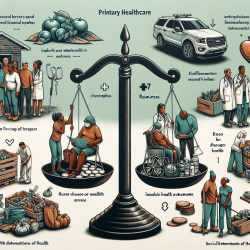Introduction
Mentorship is a cornerstone of professional development, especially for underrepresented groups in scientific fields. The research article "Promoting Cancer Health Equity: A Qualitative Study of Mentee and Mentor Perspectives of a Training Program for Underrepresented Scholars in Cancer Health Disparities" sheds light on the dynamics of successful mentorship programs. This blog explores how practitioners can leverage these insights to enhance their mentoring practices and foster better outcomes for their mentees.
Key Findings from the Study
The study identified five key themes that contribute to successful mentoring relationships:
- Effective Communication: Regular and open communication is vital. Mentees value mentors who are available, responsive, and provide constructive feedback.
- Mentor/Mentee Similarities and Differences: While shared gender was significant for female mentees, shared values and interests were often more crucial than demographic similarities.
- Building Skills and Knowledge: The program was instrumental in developing research skills and boosting mentees' confidence in their scientific abilities.
- Program Supportive Opportunities: Networking, funded scholarships, and peer support played significant roles in enhancing the mentoring experience.
- Challenges and Benefits of Program Delivery: The shift to virtual delivery during the COVID-19 pandemic highlighted both accessibility benefits and challenges in maintaining peer support.
Implementing Research Outcomes
Practitioners can draw several actionable insights from this study to improve their mentoring practices:
- Prioritize Communication: Establish regular check-ins and maintain open lines of communication. This helps in setting clear expectations and fosters a supportive environment.
- Embrace Diversity: Recognize the importance of both shared experiences and diverse perspectives. Encourage mentees to explore their unique backgrounds as strengths.
- Focus on Skill Development: Provide opportunities for mentees to engage in research projects that build their skills and confidence.
- Leverage Technology: Utilize virtual tools to enhance accessibility and flexibility, making mentorship more inclusive for those with additional responsibilities.
Encouraging Further Research
While the study provides valuable insights, it also highlights areas for further research. Practitioners are encouraged to explore the dynamics of mentorship in different contexts and with diverse populations. Understanding these nuances can lead to more tailored and effective mentoring strategies.
Conclusion
The findings from the study underscore the importance of structured mentorship programs in promoting cancer health equity. By implementing these research outcomes, practitioners can enhance their mentoring practices, leading to better outcomes for underrepresented scholars.
To read the original research paper, please follow this link: Promoting Cancer Health Equity: A Qualitative Study of Mentee and Mentor Perspectives of a Training Program for Underrepresented Scholars in Cancer Health Disparities.










